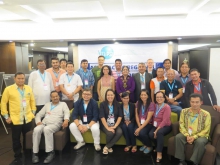Building workers’ power in the utilities sector in Asia Pacific

Ms. V Lakshmi, PSI AP Regional Secretary, opened the meeting. She said privatisation of water and electricity is a global issue, and it is facing global resistance. It is crucial that we raise a collective voice at regional level, she added.
Speaking on behalf of the public services workers’ coalition Sentro ng mga Nagkakaisa at Progresibong Manggagawa (SENTRO) general secretary, Mr. Josua Mata, shared how after 40 years of public investment in the electric cooperative Albay Electric Cooperative (ALECO), the latter has been successful in bringing electricity to rural areas. However, ALECO was put up for corporatisation, which effectively means privatisation under the San Miguel Corporation Global Power Holdings Corporation. This led to ALECO’s electricity prices to consumers becoming among the highest in the region and the declared cost of production among the highest in the world, in addition to frequent black outs and erratic supply. Workers were not spared: 350 posts were cut and contractualisation increased with lower wages and no benefits.
However, the joint struggle of the community and trade union in Albay is gaining momentum. With the debt of San Miguel Corporation higher than when the company came in, local governments are saying that San Miguel Corporation has failed and that they want ALECO back as a cooperative. The company has made an announcement that they might retreat by the end of the year. Sharing the experience of Osaka City, Mr. Takafumi Tsujitani, from the All Japan Water Supply Workers Union (ZENSUIDO), stressed that privatisation of public utilities, including water, is part of government policy, despite the fact that water is a human right. He concluded by emphasising the importance of support and collaboration with PSI in this struggle.
One of the key questions raised in the discussion concerns alternatives. During the ALECO struggle, the union had proposed a cooperative-to-cooperative partnership, meaning that when one cooperative is in trouble technically or financially, it can call on another cooperative to help it and there is no need for private entities to be involved. Mr. Victor Chiong, from the Alliance of Government Workers in the Water Sector (AGWWAS), stressed that the only long term solution to the water crisis is the people’s effective control over water systems and resources, or Public-Public Partnerships (PUPs). He concluded by stressing the commitment of AGWWAS to the campaign against privatisation and for PUPs, the importance of working in social alliances and the consolidation of unions in the sector.
Mr. Ian Mariano, PSI Sub-regional Secretary for Southeast Asia, highlighted the strength of unions coming together. After a fruitful day of discussion and sharing, trade union representatives decided to recommend to the APRECON (PSI’s Asia Pacific Regional Conference) to be held in 2016 to institutionalise a Utilities and Local government /Municipalities Network that will address privatisation of public services, work towards campaigns for re-municipalisation and promote sectoral organising. Read more.

